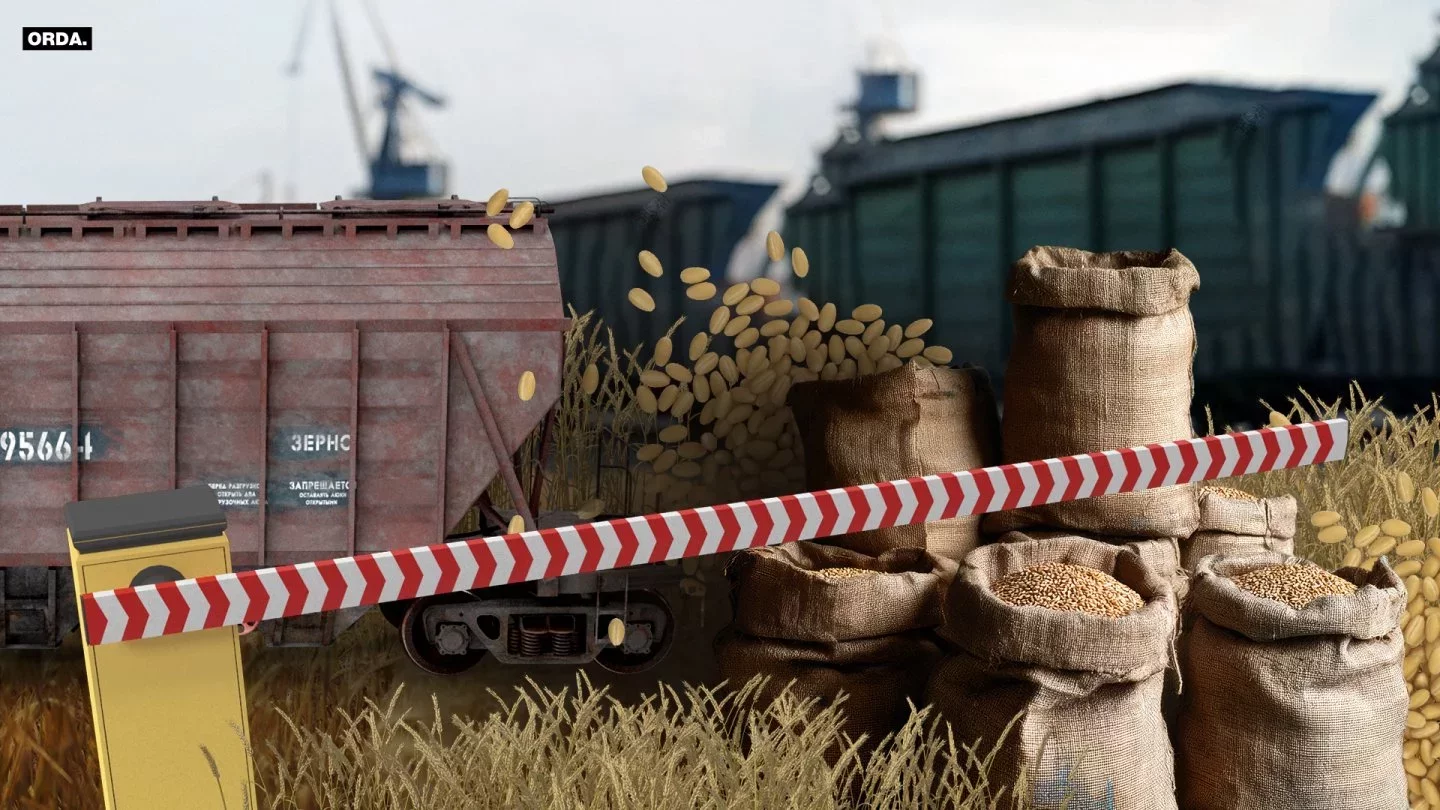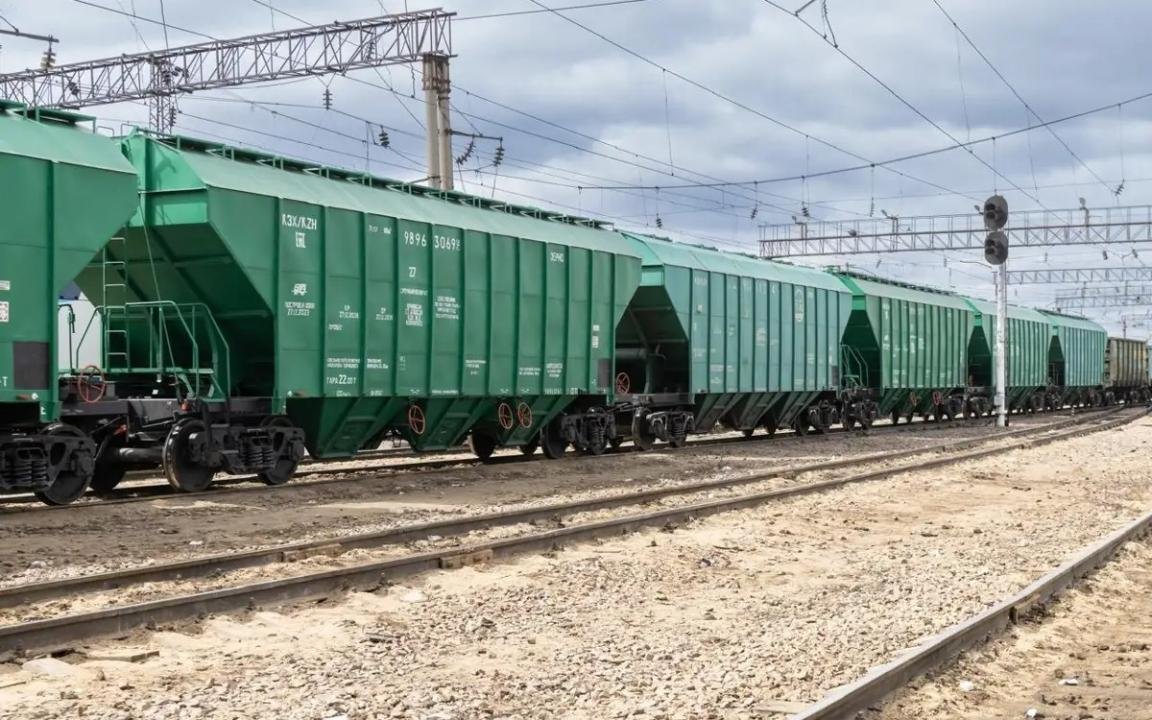China or KTZ: Who Is to Blame for Kazakh Grain Wagons Stuck at The Border?
 Photo: Orda.kz
Photo: Orda.kz
Currently, thousands of grain wagons are standing idle at Kazakhstan’s borders with China and Uzbekistan, waiting to be exported. The wagons are piling up in sidings and dead-end tracks because Kazakhstan Temir Joly (KTZ) is prohibiting them from crossing the border, while claiming the company is not at fault.
Orda.kz investigated who is actually responsible for thousands of tons of Kazakh grain getting stuck at the border.
The situation with border delays in grain exports triggers déjà vu. Last year, things were almost exactly the same, at least at the border with China. One reason given back then was that China had tightened controls on grain imports, increasing inspection times two- or even threefold — from five days to nearly two weeks.
How is the situation explained this year?
More or less the same way. A statement published by KTZ on October 28 said:
In October of this year, there has been a reduction in the number of trains accepted by the People’s Republic of China through the Altynkol border crossing — from 14 to 10 trains per day, and on some days down to six. The competent authorities of the PRC are conducting in-depth inspections of grain shipments, including sampling and laboratory analysis in Urumqi and Beijing. The inspection takes from five to ten days.
The statement also noted that around 3,000 wagons had accumulated at the border.
A memo addressed to the presidential administration, obtained by Orda.kz, provided more specific figures for late October.
Here is a quote from that memo:
The Chinese side has tightened control and is conducting lengthy sample analyses of grain by China’s customs and phytosanitary services. In addition, Kazakhstan’s grain export potential significantly exceeds the receiving capacity, which is limited by unloading infrastructure on the Chinese side, as well as customs clearance requirements. As a result, 596 covered wagons and 2,666 containers have accumulated at the border with China.
Speaking with an Orda.kz journalist, KazGrain exporters association chairman Zeinolla Abdumanapov estimated that by late November, the backlog at the Chinese border had already reached roughly 7,000 wagons.
In addition to Altynkol station, wagons are also stuck at Dostyk.

But beyond China, grain wagons this year also cannot enter Uzbekistan. Trains to the southern neighbor pass through Saryagash station. And in the same memo, the following was noted:
At the Saryagash border crossing (Tashkent junction), 37 wagons are idle due to full terminals and elevators across Uzbekistan.
According to Abdumanapov, the situation at the southern border is now at least as bad as at the Chinese one — around 7,000 idle grain wagons. According to another Orda.kz source, the situation may be even worse — the number could reach 12,000 wagons.
Meanwhile, according to official data from the Ministry of Agriculture, Uzbekistan accounts for almost half of all Kazakhstan's grain exports — 1.23 million tons out of 2.6 million (as of November 13).
But the wagons are not standing still simply because China and Uzbekistan are not letting them in. They are also subject to transport bans issued by KTZ-Freight Transportation.
Only in October of this year, KTZ issued nine separate bans on grain shipments in different directions, the memo states.
In November, the bans continued. Examples of two bans issued on November 10 were published in Threads by the KazGrain association.


On November 15, KTZ published a press release containing the following statement:
There have been temporary difficulties in the Central Asia direction. To preserve the harvest, free up elevator capacity, and increase grain shipment rates, KTZ temporarily restricted all cargo movement through Saryagash station except for grain. A plan has been agreed with the Uzbek side to increase train reception. Stations have been identified in Uzbekistan where grain shipments will be organized by route trains.
However, Orda.kz also has a letter from the Grain Union of Kazakhstan addressed to members of the grain operations task force. It states that on November 18, KTZ extended the ban on grain shipments through Altynkol, Alashankou (Dostyk), and Saryagash until the end of November 2025.
According to the text of the bans, they are justified by foreign-side factors.
But recently we spoke with representatives of Uzbek Railways, and they told us they are ready to accept up to 40 trains per day. And Kazakhstan is currently sending no more than 33 trains per day. So there is this ‘forwarding blame’: Kazakhstan says the Uzbeks supposedly aren’t ready to accept trains, and Uzbekistan says Kazakhs supposedly aren’t sending them. The same situation is unfolding with the Chinese side. The Chinese say Kazakhstan is not sending trains, and they are ready to accept — their tracks are empty. Meanwhile, the Kazakh side says the problem lies with China, which supposedly cannot accept the volumes we send. And we don’t know the truth, said Zeinolla Abdumanapov.
He also notes that this is not the first year KTZ has introduced bans precisely during the peak export season for countries where Kazakh grain is in demand. The same applies to other crops, such as oilseeds. Abdumanapov says they tried to ask the national carrier why these bans are imposed, but received no reply to their official letter.
Orda.kz has sent a similar inquiry to KTZ-Freight and is also awaiting a response.
But regardless of the real reason the wagons are standing, a logical question arises: what will happen to the grain?
Nothing will happen to the product itself. It can be stored for two or three months. Our grain is loaded into grain wagons in bulk, and into covered wagons in sacks or other packaged forms. We don’t transport grain in open gondola cars. Only violators might do that, said Zeinolla Abdumanapov.

According to him, the real damage may be to business relations. The grain trains are not traveling at random — they are headed to specific importers under signed contracts.
Importers will impose penalties. Logistics companies and freight forwarders that provided wagons will also impose fines for downtime. Because this is not force majeure,Abdumanapov explained.
But beyond the grain already technically “in transit” — though stuck at the border — a significant portion of the harvest slated for export is still being stored in elevators.
As stated in the memo:
This situation may cause dissatisfaction among grain producers due to delays in releasing elevator capacity and potential shortages of storage space. Considering that snow is forecast soon, a mass influx of grain to elevators is expected to preserve the harvest.
Since then, snow has already fallen in many regions.
According to Orda.kz sources, some grain did not fit into the elevators and is now being stored outdoors. And this carries the risk that grain covered with snow will simply spoil and never reach buyers.
Given that this situation occurs year after year, it raises troubling questions. Wheat is Kazakhstan’s number one agricultural export. Yet, somehow, during the peak export season, grain wagons suddenly lose access to border crossings.
Is this just poor planning? Or is someone at the border trying to harvest their own “crop” from grain suppliers? Perhaps it is time to investigate.
Original Author: Igor Ulitin
Latest news
- The War in Iran Opens a Window of Opportunity for Kazakhstan’s Oil Sector, Analysts Say
- Iran Conflict Escalates Beyond the Gulf: What Kazakh Experts Say About Risks for Central Asia and Kazakhstan
- Kazakhstan Prepares Possible Evacuation of Its Citizens From Iran
- LRT in Astana Is Reaching the Finish Line: The Launch Is Expected in the Coming Months
- Kazakhstan Ready to Help the UAE Amid Escalation in the Region
- Tokayev Discusses Middle East Escalation With Qatar’s Emir
- Airlines Ready to Bring Kazakhstanis Home From the Middle East
- Tokayev Sends Support Messages to Gulf Leaders Amid Regional Escalation
- Kazakhstan Bans Its Airlines From Flying Over Several Middle East Countries
- Astana Strengthens Security Measures Amid Escalation Around Iran
- Tokayev Meets U.S. Ambassador Stufft, Discusses Board of Peace Cooperation
- Mangystau Launches AI-Assisted School Monitoring to Prevent Teen Suicidal Behavior
- Kazakhstan to Supply UK With Critical Minerals
- AI Faculties for Educators to Open in Kazakhstan: What Other Changes Are Coming to the Education Sector
- There Are Medals — But Not Enough Ice: What’s Happening to Figure Skating in Kazakhstan
- Is Kazakhstan’s Nuclear Power Plant Project at Risk After New UK Sanctions? Rosatom Responds
- Prosecutor General’s Office Suspends Extradition of Navalny Ex-Staffer Detained in Almaty
- Former EBRD Executive Jürgen Rigterink Elected as New Independent Director on Bank RBK’s Board of Directors
- Kazakhstan Near Bottom of Retirement Comfort Ranking
- Kazakhstan to Open New International Flights Across Asia, the Middle East and Europe

